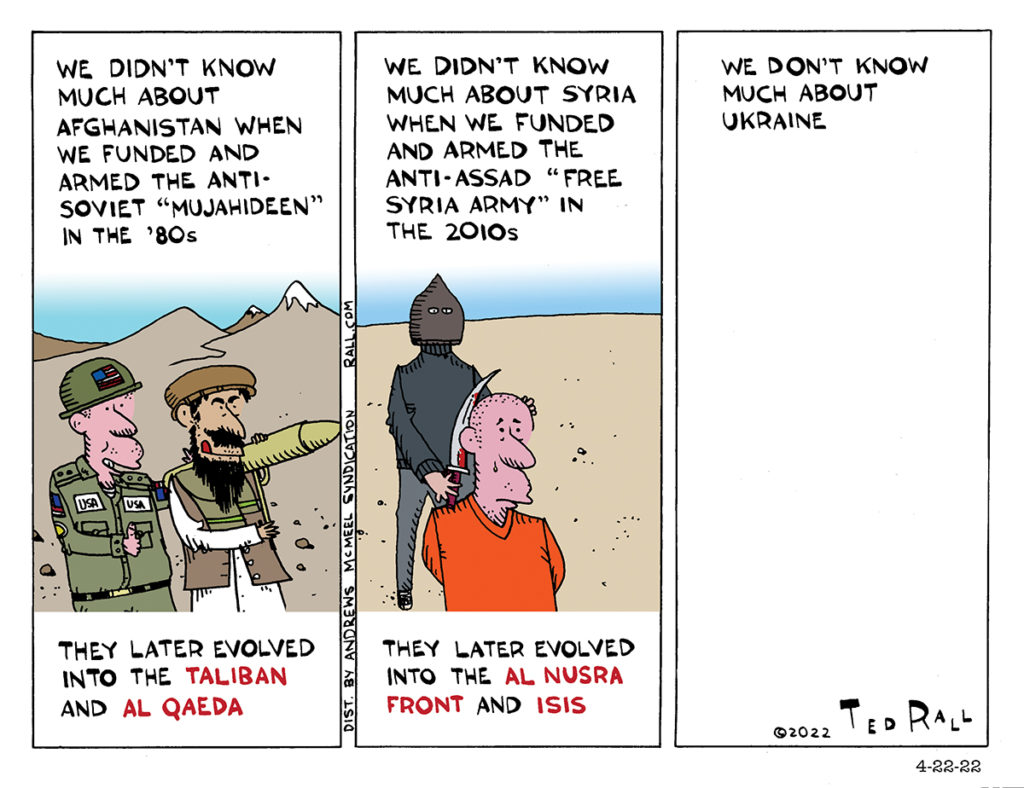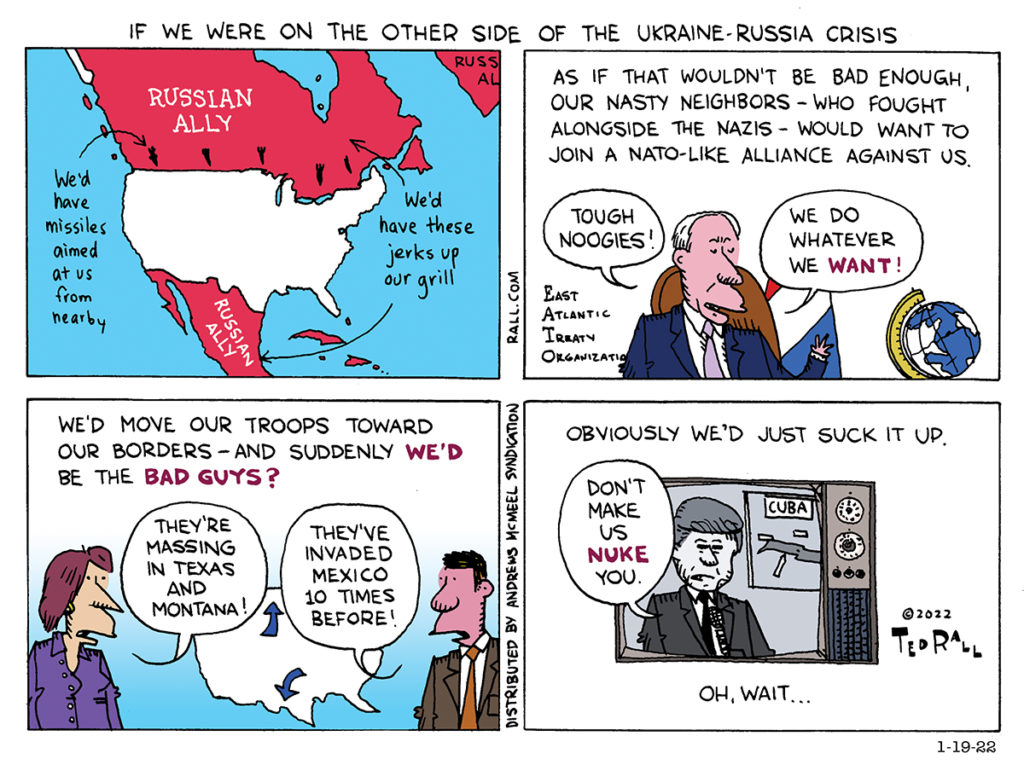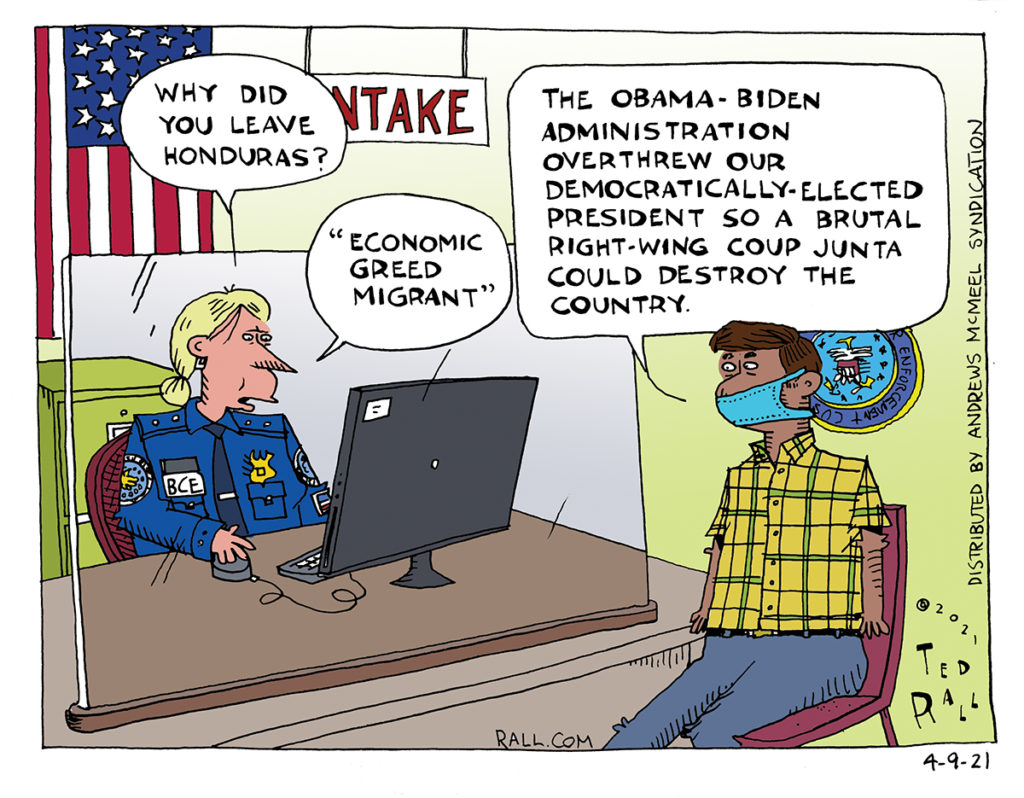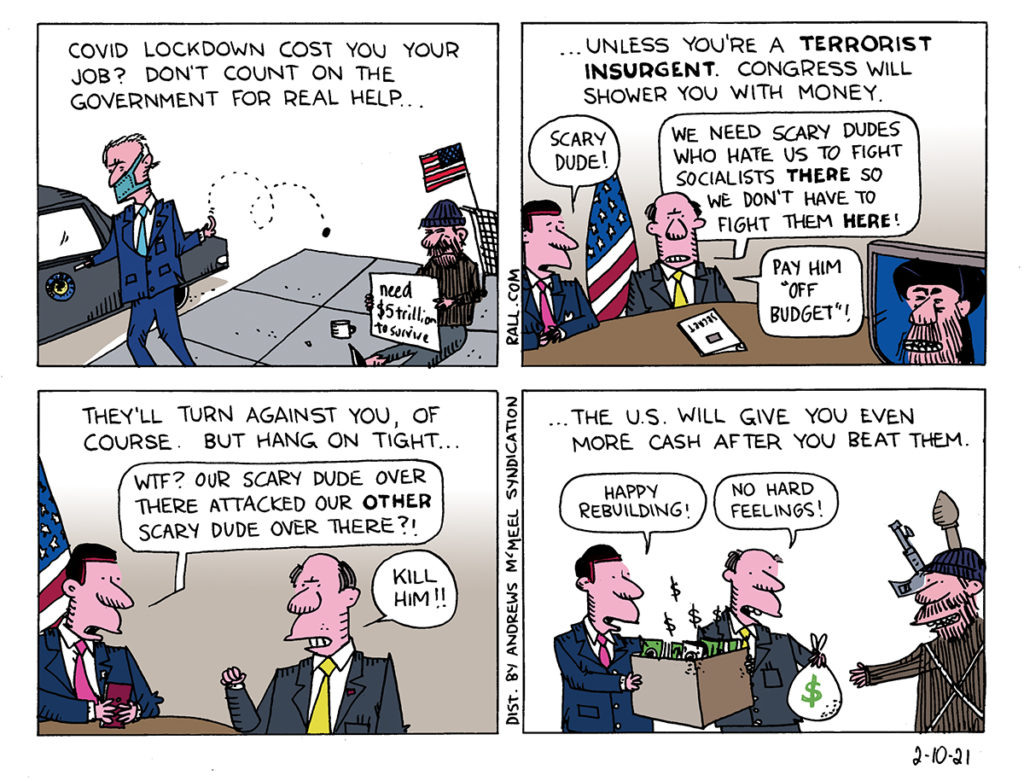The United States has a habit of arming and funding sides in civil conflicts that later become enemies. Here we go in Ukraine, supporting a questionable government of a country Americans couldn’t find on a map two months ago.
If We Were on the Other Side of the Ukraine-Russia Crisis
First the United States and its allies pressure Russia by placing missiles in Poland, near its border. Then the West tries to expand NATO right up to the Russian border, by inviting Ukraine to join. When the Russians respond by massing troops along their own border, we have the unmitigated nerve to say that they are provoking us.
New DMZ Podcast: After Afghanistan, Another War? And: What Are Our Values, Anyway?
On Foreign Policy, Joe Biden is Worse Than Trump

Trump is terrible. Biden is just as bad. In some ways the Democrat is worse.
You shouldn’t vote for either one.
Trump is erratic and unpredictable, which is dangerous. Even so, Biden is worse than Trump on international relations.
At the center of the president’s worldview is a deep, admirable and prescient skepticism about foreign interventionism. Trump began criticizing the Iraq War soon after it began, when the U.S. invasion was still popular. His critiques continued during the 2016 primaries—have you known of another Republican to campaign against militarism? As president-elect Trump told a room full of service members: “We will stop racing to topple foreign regimes that we know nothing about, that we shouldn’t be involved with.”
Trump signed the first peace agreement with the Taliban; he plans to bring home the last American troops in Afghanistan before Election Day—even sooner than required under the deal. He refuses to be goaded into a new Cold War against Russia, has met with the leader of North Korea and has offered direct talks with Iran—positions far to the left of hawkish pro-war Democrats like Hillary Clinton, Barack Obama and Joe Biden.
Because most Americans are self-centered and unconcerned about brown people in other nations, it’s ridiculous yet necessary to remind you that the Afghans we bomb are real people like you and me, that Iraqis are scarred for life when their children are hobbled by American bullets, that Yemenis cry for their dead blown to bits by American missiles, that our insane decision to turn Libya from the most prosperous country in Africa into a failed state with 21st century slave auctions is an atrocity, that we have murdered hundreds of thousands of innocent people in the last couple of decades for no reason that can be justified under common sense or international law.
The United States is the greatest exporter of death, oppression and exploitation on the planet. Every human being has the duty to oppose it. We who pour our taxes into the U.S. government have the biggest duty of all to fight the war machine. That begins with holding the murderers and their enablers accountable for their—there is no better word—evil.
Wars of choice are not horrors of happenstance, like a tornado. Political leaders vote to slaughter and maim men, women and children and ruin economies around the globe, leading to still more death. Some politicians are especially nefarious, convincing other politicians to vote for mass murder.
Politicians like Joe Biden.
Most recently, after Trump signaled his willingness to dump U.S.-backed rightist Juan Guaidó and meet with Venezuelan president Nicolás Maduro, a socialist, Biden called Maduro a “dictator” and pledged fealty to right-wing Venezuelan exiles in South Florida. It was the latest in a long line of foreign policy calls that we have come to expect from a right-wing Republican like George W. Bush—yet Biden plays a “Democrat” on TV.
“He’s registered some antiwar positions from time to time, as when he voted against the first Gulf War or opposed the funding of the Nicaraguan contras in the 1980s. But overall, he’s racked up a track record of supporting overseas adventures,” observed Branko Marcetic, writing for Jacobin.
Biden, notes Marcetic, pushed for “the 1999 bombing of Serbia, which actually dissolved the local pro-democracy movement and rallied popular support around the country’s dictator.” Biden voted for the U.S. wars against Afghanistan and Iraq. “I voted to go into Iraq, and I’d vote to do it again,” Biden said in August 2003. Now he defends himself by saying he was so stupid that he fell for Bush’s lies about WMDs.
Biden was the guy who convinced Obama to ramp up Bush’s drone assassination program, which kills 50 innocent bystanders for every 1 targeted “militant”—who often gets away and is rarely a threat to the United States, just to our authoritarian allies. Someday soon Biden’s drone killings abroad will be used to justify killing Americans here at home.
Elsewhere Marcetic writes: “When Reagan invaded Grenada in 1983, bombing a hospital in the process, Biden said he ‘did the right thing.’ When he bombed Libya three years later, killing 36 civilians and dictator Muammar Gaddafi’s 15-month-old daughter, Biden said, ‘There can be no question that Gaddafi has asked for and deserves a strong response like this.’ And when George H. W. Bush invaded Panama three years after that, an outrageous war to depose a leader who had been a CIA asset and that saw dead civilians ‘buried like dogs,’ as one witness put it, Biden called it ‘appropriate and necessary.’”
A vote for Biden isn’t just a vote against Trump. It’s a vote in favor of Biden’s vote to kill one million Iraqis. If we elect Joe Biden, we will send a message to the world: America hates you, we’re glad we killed all those people and we plan to kill more.
It will also send a message to Biden: Heckuva job, Joe!
(Ted Rall (Twitter: @tedrall), the political cartoonist, columnist and graphic novelist, is the author of the biography “Political Suicide: The Fight for the Soul of the Democratic Party.” You can support Ted’s hard-hitting political cartoons and columns and see his work first by sponsoring his work on Patreon.)
Where’s Your Football, Lucy?
President Trump’s order to withdraw American troops who created a buffer zone between Turkey and Kurdish-controlled areas of Iraq was a controversial movie seen as a betrayal of a long-time American ally. But there’s a long history of US forces making extravagant promises to local forces, then withdrawing and leaving them to the wolves.
The Secret Campaign for 2020: Where the Democratic Candidates Stand on Foreign Policy

Americans vote their pocketbooks. It’s the economy, stupid. Absent a war or recent terrorist attack, conventional wisdom believes that voters prioritize domestic issues. Right now, conventional wisdom is correct. According to the latest Pew Research poll, the five most important issues for Democrats are healthcare, education, Medicare, poverty and the environment.
So it’s not surprising that the major Democratic presidential contenders’ campaigns are focusing on economic and other America-centric issues. Nor is it shocking that the news media, never more anemic or less willing to question the candidates, is ignoring their stances on foreign policy. You could watch 5 hours and read 50 pages of news every day and never learn where a top Dem stands on issues of war and peace, defense spending, assassination drones, Guantánamo, NSA surveillance of Americans, foreign adventurism or human rights. Trust me, I know.
Still, voters deserve to know the would-be presidents’ positions on issues that extend beyond U.S. borders. Here’s what I found.
The Democrats on Our Crazy Defense Spending
The military sucks up 54% of discretionary federal spending. Pentagon bloat has a huge effect on domestic priorities; the nearly $1 trillion a year that goes to exploiting, oppressing, torturing, maiming and murdering foreigners could go to building schools, college scholarships, curing diseases, poetry slams, whatever. Anything, even tax cuts for the rich, would be better than bombs. But as then GOP presidential candidate Mike Huckabee said in 2015, “The military is not a social experiment. The purpose of the military is to kill people and break things.” If you’re like me, you want as little killing and breaking as possible.
Unfortunately, no major Democratic presidential candidate favors substantial cuts to Pentagon appropriations.
Current frontrunner Joe Biden (33% in the polls) doesn’t talk much about defense spending. He reminds us that his son served in Iraq (so he cares about the military) and that we shouldn’t prioritize defense over domestic programs. Vague. Though specific programs might get trimmed, Lockheed Martin could rest easy under a President Biden.
“Since he arrived in Congress, [runner-up] Bernie Sanders [19%] has been a fierce crusader against Pentagon spending, calling for defense cuts that few Democrats have been willing to support,” The Hill reported in 2016. “As late as 2002, he supported a 50 percent cut for the Pentagon.” Bernie is still a Pentagon critic but he won’t commit to a specific amount to cut. He wouldn’t slash and Bern. He’d trim.
Elizabeth Warren (8%) wants “to identify which programs actually benefit American security in the 21st century, and which programs merely line the pockets of defense contractors — then pull out a sharp knife and make some cuts.”
Neither Pete Buttigieg (8%) nor Beto O’Rourke (6%) have articulated any firm foreign policy positions whatsoever. Buttigieg brags about having served in the Navy Reserve. Unlikely that either man would change much.
Kamala Harris (5%) has not weighed in on military spending. She has received substantial campaign contributions from the defense industry, though.
The Democrats on Wars for Fun
As senator, Biden voted for the optional wars against Afghanistan and Iraq. He lied about his votes so maybe he felt bad about them. He similarly seems to regret his role in destroying Libya.
Sanders voted to invade Afghanistan. His comment at the time reads as hopelessly naïve about the bloodthirsty Bush-Cheney regime: “The use of force is one tool that we have at our disposal to fight against the horror of terrorism and mass murder… it is something that must be used wisely…and with great discretion.” Sanders voted against invading Iraq, favored regime change in Libya (albeit nonviolently) and voted to bomb Syria.
There have been no major new wars since 2013, when Warren joined the Senate so her antiwar bona fides have not been tested. Like many of her colleagues, she wants an end to the “forever war” against Afghanistan. She also wants us out of Syria.
Harris too is new to the Senate (2017). Statements on various conflicts indicate that she is a foreign policy hawk in the Hillary Clinton mold. Harris favors the U.S. bombing campaign against Syria, blank-check approval for Israel and sabre-rattling against North Korea. She buys into the discredited Russiagate narrative.
Warren is the only high-level antiwar candidate but she could be BSing.
Democrats on Drones
The assassination drone program begun by Bush and expanded upon by presidents Obama and Trump have killed thousands of innocent people in Africa, the Middle East and South Asia, almost all innocent. Drone strikes have demolished America’s moral standing. “Just about everywhere else in the world, opposition to drone strikes is sweeping,” The Washington Post reported in 2014. Anti-American terrorists often cite drone strikes as justification for attacking the U.S. It’s only a matter of time before other countries, and non-state actors like Hezbollah and ISIS, use them against us.
Though generally skeptical of large ground invasions like Iraq, Biden is a fan of drone assassinations. Sanders acknowledged in a 2015 interview with me that drones make killing “too easy” but nevertheless said he would continue terror-by-air as president. Warren doesn’t talk about drones. Neither does Harris.
None of the major Democratic candidates would cancel the drone program.
Democrats on Gitmo
Opened shortly after 9/11, the U.S. concentration camp at Guantánamo is a nasty blotch on America’s human rights record that terrorists use to justify killing Americans and put the lie to every pronouncement the government issues about human rights abuses in other countries. Torture, rape and even murder are routine at this notorious facility.
In 2005 Biden said the U.S. “needs to move toward shutting down” Gitmo. In 2016 he said he “hoped” it would close down. He has not called for an immediate shutdown.
Kamala Harris always refuses to comment—a stance that speaks volumes.
Bernie Sanders and Elizabeth Warren are the only two who have consistently argued that Gitmo should be closed. “We look like hypocrites and fools to the entire world,” Sanders said in 2016.
Democrats on NSA Spying Against Americans
The mass surveillance programs revealed by Edward Snowden continue to scoop up every email, text message, phone call and every other form of communication you can think of within and into the United States. Whether the NSA and other agencies will be allowed to continue will determine whether we can avoid an Orwellian dystopia.
Joe Biden, though to the right on other foreign-policy issues, was a critic of NSA spying for years, going back at least to 2006. Under Obama, however, he backtracked. Even worse, Biden called the president of Ecuador in 2013 to request that he deny asylum to NSA whistleblower Edward Snowden.
Bernie Sanders alone would end warrantless mass surveillance and said Snowden “did this country a great service.” Warren doesn’t discuss it much except to say it would be nice to have “an informed discussion.” Harris favors some limits but generally keeps quiet.
Except for Biden, the Democratic presidential field is dominated by progressives and progressives-come-lately—on domestic issues. When it comes to foreign policy, there isn’t as much difference as progressive voters would like between the Democratic and Republican parties.
(Ted Rall, the cartoonist, columnist and graphic novelist, is the author of “Francis: The People’s Pope.” You can support Ted’s hard-hitting political cartoons and columns and see his work first by sponsoring his work on Patreon.)
Trump’s Foreign Policy: Hated by Pundits But Popular with Voters
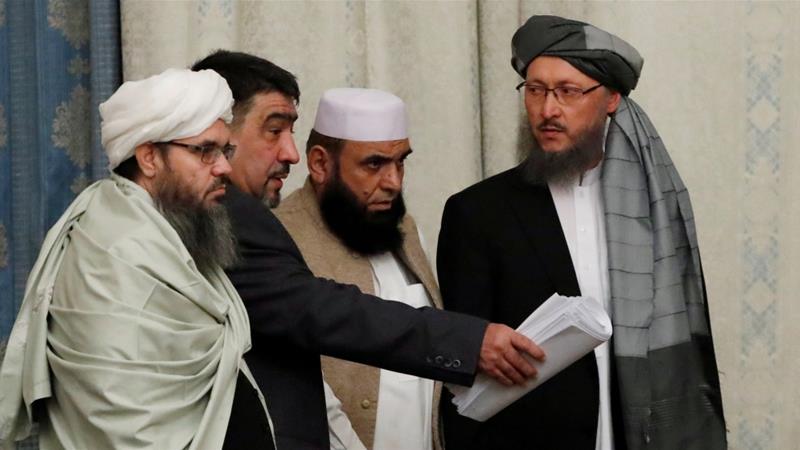
President Trump keeps coming under attack for his foreign policy, predictably by Democrats but also by legacy Republican leaders.
“I’m very concerned,” Senator James Inhofe (R-OK), chairman of the Senate Armed Services Committee, said about Trump’s plans to bring troops home from the Middle East.
“It makes it abundantly clear that we are headed towards a series of grave policy errors which will endanger our nation, damage our alliances and empower our adversaries,” said Marco Rubio.
Trump’s late-2018 announcement that he planned to withdraw 2000 US troops from the meatgrinder of Syria’s brutal civil war prompted bipartisan dismay. Next the new Doha peace framework to end US involvement in Afghanistan had establishment politicos and pundits reviving their hoary, false canard that America’s “abandonment” of Afghanistan after the Soviets withdrew in 1989 led to 9/11. Now he’s getting attacked for trying to reach a nuclear disarmament deal with North Korea (possible bonus: a formal end to the Korean War).
Deescalation? Why, that could cause peace! What could be a more dangerous threat to American interests?
Meanwhile, Trump is still in Syria. He’s expanded Obama’s drone assassinations. He wants to spend even more on defense. The pro-war wise men of the media have zero problem with hawkishness, no matter how stupid or immoral.
Conventional wisdom holds that this criticism will cost Trump. I disagree. While the president’s America First foreign policy has no constituency within the leadership caste of either party, it has one he cares about more: the voters.
Interestingly, a high percentage of Americans (65%) disapprove of Trump’s handling of international affairs generically. No doubt they’ve been influenced by “Trump is a child on foreign stuff” coverage.
Yet when it comes to specifics, Americans mostly approve of his moves to deescalate tensions overseas and reduce foreign entanglements.
77% of Americans approved of the first summit between Trump and Kim. 54% thought it went well. That’s significantly more than the portion of Americans who approved of his presidency in general, indicating that on this issue he enjoyed support from many Democrats.
Support for withdrawing troops from Syria is close to 50-50, not stellar yet significantly better than his overall mid-40s approval rating.
Afghanistan is a no-brainer for the president. Most Americans want immediate withdrawal and a whopping 70% say that we never should have invaded in the first place.
Trump’s disentanglement policies are popular. The reason that his overall numbers on international matters run low has more to do with the tone and image he projects than the policies he has promulgated. People like what he’s doing but not how he looks and sounds as he does it.
Trump got elected in large part by ignoring GOP dogma and selling his ideas directly to the American people. Voters were tired of an immigration crisis created and prolonged by both parties and they were angry about deindustrialization and vicious “free trade.” Trump’s proposed solutions—the Wall and a trade war—might not be intelligent or effective. But he addressed both issues when others, especially Hillary Clinton, would not. Voters prefer a president who does something stupid to fix a problem to one who pretends it doesn’t exist.
With foreign policy, Trump is trying to pull off a similar trick as he did with domestic issues in 2016: addressing the “endless war” problem that spun out of control under Bush. If not for Trump neither major party would have touched a Pentagon with so many bases abroad it can’t give you an exact number. The question for 2020 is whether voters — who traditionally decide how to vote based on the state of the economy — will give Trump credit for nibbling at the edges of America’s militaristic bloat.
(Ted Rall (Twitter: @tedrall), the political cartoonist, columnist and graphic novelist, is the author of “Francis: The People’s Pope.” You can support Ted’s hard-hitting political cartoons and columns and see his work first by sponsoring his work on Patreon.)

